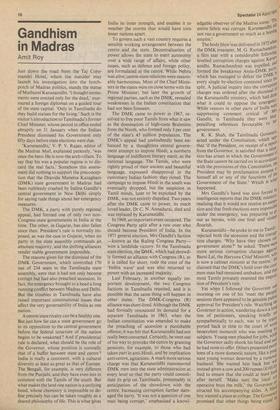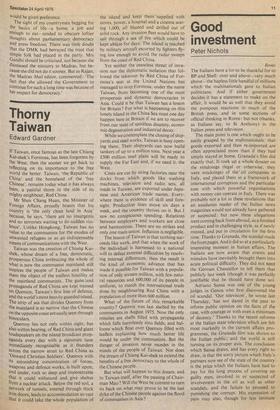Gandhism in Madras
Amit Roy
Just down the road from the Taj Coromandel Hotel, where the outsider may launch his investigation into the hotchpotch of Madras politics, stands the statue of Muthuvel Karunanidhi. 'I thought monuments were erected only for the dead,' murmured a foreign diplomat on a guided tour of the state capital. 'Only in Tamilnadu do they build statues for the living.' Such is the visitor's introduction to Tamilnadu's former Chief Minister, whose period in office ended abruptly on 31 January when the Indian President dismissed his Government only fifty days before state elections were due.
'Karunanidhi,' V. P. V. Rajan, editor of the Madras Mail, explained patiently, 'was once the hero. He is now the arch-villain. To say that his was a popular regime is to discard the real facts.' Somehow this assessment did nothing to support the preconception that the Dravida Munetra Kazagham (DMK) state government in Madras had been ruthlessly crushed by Indira Gandhi's central government in New Delhi simply for saying rude things about her emergency measures.
The DMK, a party with purely regional appeal, had formed one of only two nonCongress state governments in India at the time. The other, in Gujarat, has also fallen since then. President's rule is normally imposed, as was the case in Gujarat, when no party in the state assembly commands an absolute majority, and the shifting alliances render stable government impossible.
The reasons given for the dismissal of the DMK Government, which controlled 170 out of 234 seats in the Tamilnadu state assembly, were that it had not only become corrupt but had also preached secession. In fact, the emergency brought to a head a long running conflict between Madras and Delhi. But the troubles in Tamilnadu have also raised important constitutional issues that affect the very governability of India as one nation.
A centre-state rivalry can be a healthy one. But just how far can a state government go in its opposition to the central government before the federal structure of the nation begins to be weakened ? And if presidential rule is declared, what should be the role of the Governor, whose position is normally that of a buffer between state and centre ? India is really a continent, with a cultural diversity at least as great as that of Europe. The Bengali, for example, is very different from the Punjabi, and they have even less in common with the Tamils of the south. But what makes the land one nation is a unifying bond, whose chemistry is impossible to define precisely but can be taken roughly as a shared philosophy of life. This is what gives India its inner strength, and enables it to weather she storms that would have torn lesser nations apart.
To govern such a vast country requires a sensible working arrangement between the centre and the state. Decentralisation of power allows the state to exert autonomy over a wide range of affairs, while other issues, such as defence and foreign policy, are formulated at the centre. While Nehru was alive, centre-state relations were reasonably harmonious. Most of the Chief Ministers in the states were on close terms with the Prime Minister; but later the growth of regional parties, such as the DMK, revealed weaknesses in the Indian constitution that had not been foreseen.
The DMK came to power in 1967, resolved to free poor Tamils from what it saw as the domination of high-caste Brahmins from the North, who formed only 3 per cent of the state's 45 million population. The DMK's appeal had undoubtedly been enhanced by a thoughtless central government attempt to impose Hindi, a northern language of indifferent literary merit, as the national language. The Tamils, who were rightly proud of their ancient and beautiful language, expressed disapproval in the customary Indian fashion: they rioted. The campaign to impose Hindi in the south was eventually dropped, but the suspicion in Tamil minds, later to be exploited by the DMK, was not entirely dispelled. Two years after the DMK came to power, its much loved leader, Dr C. N. Annadurai, died and was replaced by Karunanidhi.
In 1969, an important event occurred. The Congress Party split after a row over who should become President of India. In the 1971 general election, Mrs Gandhi's faction —known as the Ruling Congress Party— won a landslide victory. In the Tamilnadu .state election, the DMK, which had shrewdly formed an alliance with Congress (R), as it is called for short, rode the crest of the 'Indira wave' and was also returned to power with an increased majority.
Last February, in another equally important development, the two Congress factions in Tamilnadu reunited, and it is possible that the same thing will happen in other states. The DMK-Congress (R) alliance was short-lived. Although the DM K had formally renounced its demand for a separate Tamilnadu in 1963, when the Indian constitution was amended to make the preaching of secession a punishable offence, it was felt that Karunanidhi had not really been converted. Certainly, he went out of his way to provoke the centre by granting pensions, for example, to those who had taken part in anti-Hindi, and by implication anti-centre, agitations. A much more serious charge was that Karunanidhi manoeuvred DMK men into the state administration at every level so that the party could consolidate its grip on Tamilnadu, presumably in anticipation of the showdown with the centre. Increasing corruption further damaged the party. 'It was not a question of one man being corrupt,' emphasised a knowl
edgable observer of the Madras scene. Ill! entire fabric was corrupt. Karunanidh; not run a government so much as a bootleg empire.' The body blow was delivered in 1972 when the DMK treasurer, M. G. Ramachandran a film star with a considerable following' levelled corruption charges against Karuni anidhi. Ramachandran was expelled, a° formed the breakaway Anna-DM K 1/3,,rt,?;; which has managed to defeat the every single by-election contested since !n: split. A judicial inquiry into the corruPti°7 charges was ordered after the dismissal °e the Karunanidhi ministry, which had doti what it could to oppose the emergene,Y" While censors in other parts of India we's suppressing comment critical of Ivir, Gandhi, in Tamilnadu they were bluer pencilling references favourable to he government. K. K. Shah, the Tamilnadu Governor; acted under the Constitution, which saYt that If the President, on receipt of a ref°, from the Governor, is satisfied that a snaaf tion has arisen in which the Government °„ the State cannot be carried on in accordane; with the provisions of this Constitution, tlio President may by proclamation assunle ,le himself all or any of the functions of WI Government of the State.' Which is villa happened. Mrs Gandhi's hand was also forced bY, intelligence reports that the DMK realising that it would not receive an extell,. sion and that fresh elections were impossible, under the emergency, was preparing 1° gt out as 'heroes, with one final and violerl flourish. Karunanidhi—he spoke to me in Tamil-rejected both the secession and the corrar non charges. 'Why have they chosen oee government alone?' he asked. 'There Wert more serious corruption charges aga11120 Bansi Lal, the Haryana Chief Minister, vi,,ue is now a cabinet minister at the centre.' P. claimed that the DM K's hold over the cool, mon man had remained unshaken, and 1113,, most Tamils privately resented the iMP°51 tion of President's rule. Yet wh'en I followed the Governor one, morning on one of his 'meet the Pe°,P,I1,.
sessions there appeared to be genuine
approval for President's rule. Watching Governor in action, wandering down a1011', line of petitioners, speaking brieflY Ye, sympathetically to each, was to be (raise ported back in time to the court of 501; benevolent monarch who was meeting 11.1ie subjects. Young men pleaded for jobs, v411.1 the Governor sadly shook his head and sal° he had none to offer. Others presented Pr°17 ; lems of a more domestic nature, like a Preg,, nant young woman deserted by a runavt husband. She wanted him back but W'r instead given a cow and 200 rupees (£10) feed to ensure that she could at least 10° after herself. 'Make sure the local err operative buys the milk,' the Governor .trld structed his accompanying aides. A 1/11111 boy wanted a place at college. The Govern° promised that other things being equal 11
would be given preference.
The sight of my countrymen begging for the basics of life—a home, a job and enough to eat—tended to obscure loftier thoughts about parliamentary democracy and press freedom. There was little doubt that the DMK had betrayed the trust that simple folk had placed in the party. Mrs Gandhi should be criticised, not because she dismissed the ministry in Madras, but because she did not do it sooner. But as Rajan, the Madras Mail editor, commented: 'The fact that she allowed the Government to continue for such a long time was because of her respect for democracy.'



































 Previous page
Previous page